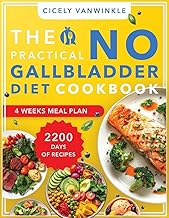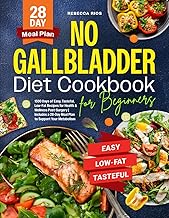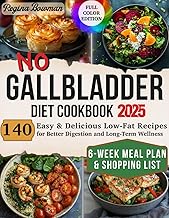|
Gallstones, which are hardened deposits that form in the gallbladder, are not edible or safe to consume. They are typically composed of cholesterol, bilirubin, or a mixture of both, and can cause significant discomfort or health issues if they block the bile ducts. Instead of considering eating gallstones, it is crucial to focus on dietary and lifestyle changes to prevent their formation or manage existing conditions. A diet rich in fiber, healthy fats, and lean proteins, along with staying hydrated and maintaining a healthy weight, can help reduce the risk of gallstones. If you suspect you have gallstones or are experiencing symptoms like abdominal pain, nausea, or jaundice, consult a healthcare professional for proper diagnosis and treatment options. Explore related products
$8.99 $14.99
$13.69
$20.99
$7.24
$9.99 $12.58
$16.99 What You'll Learn
One of the most effective dietary strategies to prevent gallstones is increasing your fiber intake. Fiber helps regulate cholesterol levels in the bile, reducing the likelihood of gallstone formation. Aim to incorporate a variety of high-fiber foods into your daily meals, such as whole grains (oats, brown rice, quinoa), fruits (apples, pears, berries), vegetables (broccoli, carrots, Brussels sprouts), and legumes (lentils, chickpeas, black beans). Soluble fiber, in particular, found in oats and beans, is beneficial as it binds to cholesterol in the digestive tract and promotes its excretion. Gradually increase your fiber intake to avoid digestive discomfort, and ensure you pair it with adequate water consumption for optimal effectiveness. Healthy fats play a crucial role in gallstone prevention by supporting gallbladder function and reducing cholesterol crystallization. Replace saturated and trans fats, which are linked to gallstone risk, with unsaturated fats like those found in olive oil, avocados, nuts, seeds, and fatty fish (salmon, mackerel, sardines). These fats help maintain bile fluidity and prevent the buildup of cholesterol-rich gallstones. Additionally, moderate fat intake is key—avoid overeating fatty foods, as excessive fat can overwork the gallbladder and increase stone formation risk. Incorporating these healthy fats into a balanced diet can significantly lower your chances of developing gallstones. Staying well-hydrated is another essential aspect of gallstone prevention. Dehydration can lead to concentrated bile, increasing the risk of cholesterol and pigment stones. Aim to drink at least 8–10 glasses of water daily, and consider herbal teas or infused water for variety. Avoid excessive caffeine and alcohol, as they can dehydrate the body and strain the gallbladder. Proper hydration ensures that bile remains diluted, reducing the likelihood of gallstone formation. Pairing hydration with regular, balanced meals further supports gallbladder health by preventing bile from becoming overly concentrated. In addition to fiber, healthy fats, and hydration, maintaining a healthy weight through diet is critical for gallstone prevention. Rapid weight loss or yo-yo dieting can increase gallstone risk by disrupting bile composition. Instead, focus on gradual, sustainable weight management through a balanced diet rich in whole foods. Include lean proteins (poultry, tofu, eggs), limit refined sugars and processed foods, and avoid skipping meals. Regular, nutrient-dense meals keep your gallbladder active and reduce the risk of bile stasis, a common precursor to gallstones. Finally, certain foods and dietary habits should be avoided to minimize gallstone risk. High-cholesterol foods like fried items, fatty cuts of meat, and full-fat dairy can contribute to cholesterol gallstones. Similarly, excessive consumption of sugar and refined carbohydrates can lead to insulin resistance and increased triglyceride levels, both of which are risk factors for gallstones. Instead, prioritize whole, unprocessed foods and mindful eating practices. By focusing on fiber, healthy fats, hydration, and a balanced diet, you can significantly reduce your risk of gallstones and promote overall gallbladder health.
Signs of a Ruptured Gallbladder: Symptoms, Risks, and When to Seek Help You may want to see also
When managing gallstones, it's crucial to avoid foods that can exacerbate gallbladder issues. High-fat foods are a primary concern, as they stimulate the gallbladder to release bile, which can lead to pain and discomfort. Fried foods, such as French fries, fried chicken, and deep-fried snacks, should be strictly limited. These foods are not only high in unhealthy fats but also difficult for the gallbladder to process, increasing the risk of gallstone-related symptoms. Similarly, fatty cuts of meat like ribs, sausages, and bacon are best avoided, as their high saturated fat content can trigger gallbladder attacks. Processed foods are another category to steer clear of when dealing with gallstones. These foods often contain trans fats, which are particularly harmful to gallbladder health. Items like packaged snacks, frozen pizzas, and processed meats (e.g., hot dogs and deli meats) are loaded with additives and unhealthy fats that can worsen gallstone symptoms. Additionally, processed foods tend to be low in fiber and nutrients, offering little benefit to overall health. Opting for whole, unprocessed foods is a safer and healthier choice for those with gallstones. Sugary foods and beverages are equally problematic for individuals with gallstones. High sugar intake can lead to weight gain and insulin resistance, both of which are risk factors for gallstone development. Sweets like cakes, cookies, candies, and sugary drinks such as sodas and fruit juices should be minimized. These foods cause rapid spikes in blood sugar levels, prompting the liver to produce more cholesterol, which can contribute to gallstone formation. Instead, focus on natural sweeteners in moderation, like fresh fruits, and choose water or herbal teas as primary beverages. Dairy products, especially those high in fat, can also aggravate gallstones. Whole milk, cheese, and cream are rich in saturated fats that can overburden the gallbladder. While dairy can be part of a balanced diet, it’s advisable to opt for low-fat or fat-free versions. However, some individuals with gallstones may find that even low-fat dairy causes discomfort, so it’s important to monitor personal tolerance levels. Plant-based alternatives like almond or oat milk can be excellent substitutes for those looking to reduce dairy intake. Lastly, refined carbohydrates like white bread, pasta, and rice should be consumed sparingly. These foods are stripped of fiber and nutrients, causing rapid digestion and spikes in blood sugar. This can lead to increased cholesterol production in the liver, potentially contributing to gallstone formation. Replacing refined carbs with whole grains like brown rice, quinoa, and whole wheat bread can provide more fiber and nutrients, supporting better gallbladder health. By avoiding these trigger foods, individuals with gallstones can reduce symptoms and improve their overall well-being.
Post-Gallbladder Removal: Understanding the Risk of Developing Stones You may want to see also
When it comes to preventing gallstones naturally, incorporating specific fruits and vegetables into your diet can be highly beneficial. Apples are a standout choice due to their high fiber content, particularly soluble fiber in the form of pectin. This fiber helps reduce cholesterol levels in the bile, a key factor in gallstone formation. Eating one or two apples daily, or enjoying a glass of fresh apple juice, can support gallbladder health. Additionally, apples are rich in antioxidants, which further aid in reducing inflammation and promoting overall digestive wellness. Berries, such as strawberries, blueberries, and raspberries, are another excellent addition to a gallstone-friendly diet. These fruits are packed with fiber, antioxidants, and vitamins that help maintain a healthy weight and reduce cholesterol levels. Berries also have anti-inflammatory properties, which can alleviate stress on the gallbladder. Incorporate a handful of mixed berries into your morning oatmeal, yogurt, or smoothies for a delicious and preventive boost. Their low-calorie and high-nutrient profile makes them ideal for those at risk of gallstones. Leafy greens like spinach, kale, and Swiss chard are essential for gallstone prevention due to their high fiber and nutrient content. These vegetables help regulate bile production and reduce the concentration of cholesterol in the gallbladder. Leafy greens are also rich in vitamins C, E, and K, which support liver function and overall digestive health. Try adding a generous serving of leafy greens to salads, smoothies, or sautéed dishes daily. Their versatility and health benefits make them a must-have in any gallstone-friendly diet. Citrus fruits, including oranges, lemons, grapefruits, and limes, play a vital role in preventing gallstones due to their high vitamin C and antioxidant content. Vitamin C helps convert cholesterol into bile acids, reducing the risk of gallstone formation. The natural acids in citrus fruits also stimulate digestive enzymes, promoting better bile flow. Start your day with a glass of fresh citrus juice or add slices of lemon or lime to your water throughout the day. These fruits not only aid in gallstone prevention but also support hydration and overall immune health. Incorporating these gallstone-friendly fruits and vegetables into your daily meals is a practical and natural way to reduce the risk of gallstones. Focus on a balanced diet rich in fiber, antioxidants, and essential nutrients to support gallbladder and liver function. Pair these foods with healthy fats, lean proteins, and whole grains for optimal results. By making these dietary changes, you can take proactive steps toward preventing gallstones and improving your overall digestive health.
Can the Gallbladder Be Removed? Understanding the Procedure and Recovery You may want to see also Explore related products
$13.49
$14.97 $14.97
$14.99
$17.99
$16.49
$14.49 $22.99
When considering dietary choices to support gallbladder health and potentially prevent gallstones, the type of fats you consume plays a crucial role. Healthy fats are essential, and prioritizing sources like olive oil, avocados, and nuts can make a significant difference. These fats are rich in monounsaturated and polyunsaturated fatty acids, which are known to promote gallbladder function and reduce the risk of gallstone formation. Unlike saturated and trans fats, which can increase cholesterol levels and contribute to gallstone development, healthy fats help maintain a balanced bile composition, ensuring proper digestion and reducing strain on the gallbladder. Olive oil is a cornerstone of gallbladder-friendly diets. It stimulates the gallbladder to contract and release bile, which aids in the digestion of fats and prevents bile from stagnating, a common cause of gallstones. Incorporating olive oil into your daily routine—whether drizzled over salads, used in cooking, or taken as a tablespoon on an empty stomach—can be highly beneficial. Studies suggest that regular consumption of olive oil may lower the risk of gallstone formation, making it an excellent choice for those concerned about gallbladder health. Avocados are another powerhouse food for gallbladder health. They are packed with monounsaturated fats, fiber, and antioxidants, all of which support digestive health and reduce inflammation. The healthy fats in avocados help improve bile production and flow, while their fiber content aids in maintaining a healthy weight, a key factor in preventing gallstones. Adding avocados to meals—such as in smoothies, salads, or as a spread—can provide both nutritional and gallbladder-specific benefits. Nuts, including almonds, walnuts, and pistachios, are rich in healthy fats, fiber, and essential nutrients that support gallbladder function. They help regulate cholesterol levels in the bile, reducing the likelihood of cholesterol-based gallstones. However, it’s important to consume nuts in moderation, as they are calorie-dense. A handful of nuts per day can be a nutritious snack that contributes to overall gallbladder health without overloading the system. In contrast, saturated and trans fats found in fried foods, processed snacks, and fatty meats should be limited or avoided. These fats increase cholesterol levels in the bile, making it more likely to crystallize into gallstones. They also promote inflammation and strain the gallbladder, exacerbating existing issues. By replacing these unhealthy fats with olive oil, avocados, and nuts, you can create a diet that actively supports gallbladder health and reduces the risk of gallstone formation. Making these dietary choices not only benefits your gallbladder but also contributes to overall well-being.
Post-Gallbladder Surgery Comfort: Is Stomach Sleeping Safe? You may want to see also
Staying properly hydrated is a cornerstone of gallstone management and overall gallbladder health. Drinking plenty of water throughout the day helps to dilute bile, making it less likely to form stones. Aim for at least 8-10 glasses of water daily, and consider increasing intake during warmer weather or physical activity. Adequate hydration ensures that bile flows smoothly through the gallbladder, reducing the risk of stagnation and stone formation. It’s a simple yet effective strategy that can significantly support gallbladder function. Herbal teas can complement your hydration efforts while offering additional benefits for gallbladder health. Teas like peppermint, dandelion, and milk thistle are known to stimulate bile production and improve its flow. Peppermint tea, for instance, has antispasmodic properties that can soothe the gallbladder, while dandelion tea acts as a natural diuretic, aiding in detoxification. Milk thistle tea supports liver health, which is closely linked to gallbladder function. Incorporating 2-3 cups of these herbal teas daily can enhance hydration while providing targeted support for your gallbladder. It’s important to avoid dehydrating beverages like alcohol, excessive caffeine, and sugary drinks, as they can exacerbate gallstone issues. Alcohol and caffeine can lead to dehydration, thickening bile and increasing the risk of stone formation. Sugary drinks, on the other hand, contribute to weight gain and insulin resistance, both of which are risk factors for gallstones. Instead, focus on water and herbal teas as your primary fluids to maintain optimal hydration and gallbladder health. For those prone to gallstones, starting the day with a glass of warm water with lemon can be particularly beneficial. Lemon water helps to alkalize the body, stimulate bile production, and flush out toxins. This simple morning ritual can kickstart your digestive system and support gallbladder function. Pairing this habit with consistent water intake and herbal teas throughout the day creates a holistic hydration strategy that works in harmony with your body’s natural processes. Lastly, listen to your body’s hydration needs, especially if you experience symptoms like dark urine or infrequent urination, which are signs of dehydration. Keeping a water bottle handy and setting reminders can help you stay on track. Remember, hydration is not just about drinking water—it’s about maintaining a balance that supports your gallbladder and overall health. By prioritizing fluids like water and herbal teas, you can take a proactive step in managing gallstones and promoting long-term gallbladder wellness.
Pregnancy After Gallbladder Removal: What You Need to Know You may want to see also Frequently asked questions
What foods should I eat if I have gallstones?
Focus on a low-fat diet with lean proteins, whole grains, fruits, vegetables, and healthy fats like olive oil. Avoid high-fat, fried, and processed foods.
Can I eat dairy if I have gallstones?
Opt for low-fat or fat-free dairy products like skim milk or yogurt. Avoid full-fat dairy, as it can trigger gallstone symptoms.
Are there specific fruits or vegetables to avoid with gallstones?
No, most fruits and vegetables are safe and beneficial. However, limit gas-producing vegetables like broccoli or cabbage if they cause discomfort.
Can I eat nuts and seeds with gallstones?
Yes, but in moderation. Nuts and seeds are healthy but high in fat, so portion control is key to avoid gallbladder irritation. (责任编辑:) |














